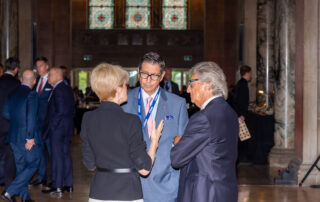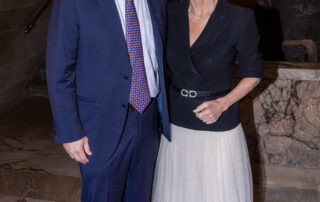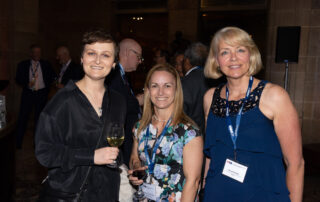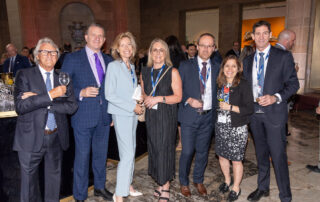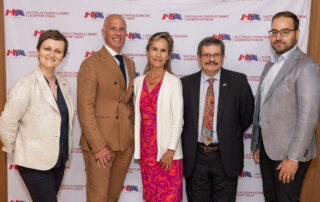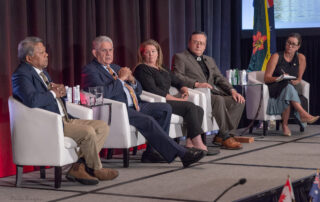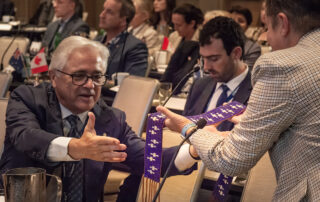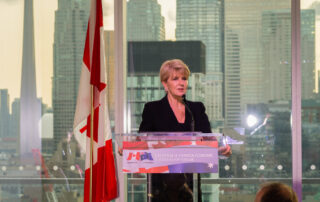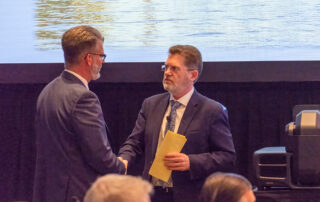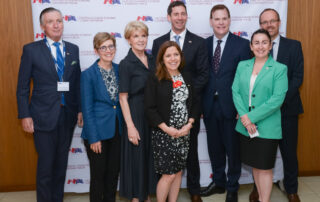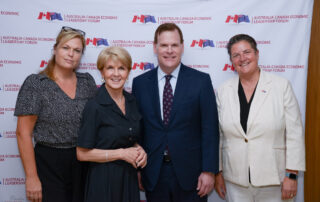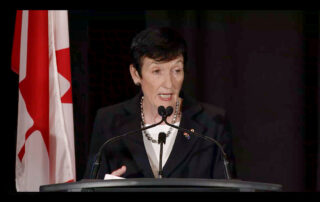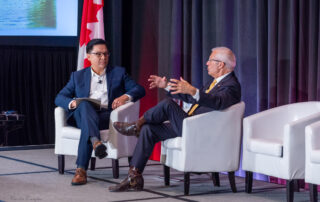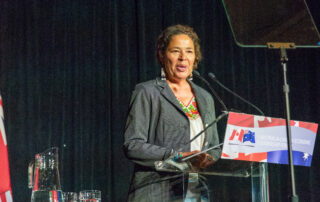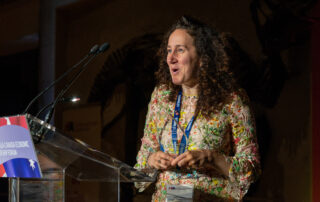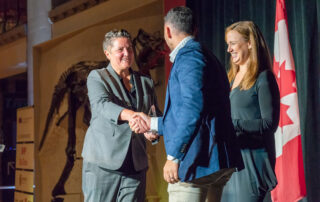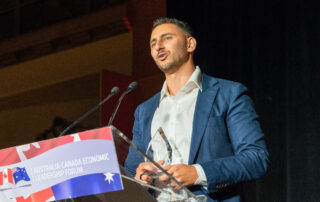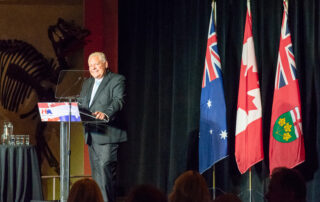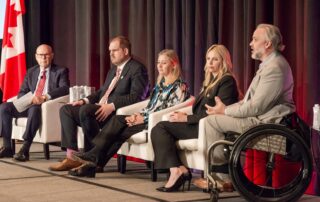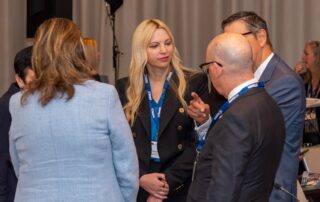
2023 Forum – Toronto, Canada
Highlight Video for the 2023 Forum Below
Australia-Canada Economic Forum 2023 | CPAC.ca
Home page to find all resources and videos about the 2023 AusCan Forum.
Australia-Canada Economic Forum 2023: Political Leaders Deliver Remarks | Public Record | CPAC.ca
The Australia-Canada Economic Leadership Forum meets for its 8th edition in Toronto. The forum brings together over 150 business and government leaders from the two countries to discuss public policy issues. Prime Minister Justin Trudeau, Ontario Premier Doug Ford, Australian Attorney-General Mark Dreyfus, Toronto Mayor Olivia Chow and Ontario Minister of Mines George Pirie address the forum throughout the three-day event. (July 17 and 18, 2023)
Australia-Canada Economic Forum 2023 | CPAC Special | CPAC.ca
CPAC’s Michael Serapio goes behind the scenes at the recent Australia-Canada Economic Forum and speaks with Australian Co-chair Julie Bishop, Canadian Co-chair John Baird, Canadian Minister of Innovation, Science and Industry François-Philippe Champagne, Saskatchewan Premier Scott Moe, Australian Attorney-General Mark Dreyfus, and Ontario Minister of Economic Development, Job Creation and Trade Vic Fedeli, as they discuss ways to increase trade and economic cooperation between the two countries. This 60-minute special presentation also features keynote speeches from Ontario Premier Doug Ford and Canadian Prime Minister Justin Trudeau. (July 18, 2023)
PM Trudeau Addresses Australia-Canada Economic Forum – July 18, 2023 | Headline Politics | CPAC.ca
Prime Minister Justin Trudeau delivers a keynote speech at the Australia-Canada Economic Leadership Forum in Toronto. The forum brings together over 150 business and government leaders from the two countries to discuss public policy issues.
CPAC anchor Michael Serapio and Ontario Minister of Economic Development Vic Fedeli discuss the province’s growing auto sector, transition to a green economy and plan to foster economic growth in the region. (July 19, 2023)
In a fireside chat with Globe and Mail columnist Tony Keller, Innovation, Science and Industry Minister François-Philippe Champagne and Australia’s Regional Development Minister Kristy McBain discuss the significance of critical mineral mining for the growth of the auto sector, cross border trade and ways to strengthen the Australia-Canada economic partnership. (July 18, 2023)
John Baird, Canada’s foreign affairs minister from 2011 to 2015, joins CPAC’s Michael Serapio to talk Canada-Australia relations and bilateral trade. This interview took place in Toronto at the 2023 Australia-Canada Economic Leadership Forum. Baird co-chairs the forum with former Australian foreign affairs minister Julie Bishop. (July 18, 2023)
Julie Bishop, Australia’s foreign affairs minister from 2013 to 2018, joins CPAC’s Michael Serapio to discuss Canada-Australia relations, China, and the AUKUS security pact – which Canada has not been invited to join. This interview took place in Toronto at the 2023 Australia-Canada Economic Leadership Forum. Bishop co-chairs the forum with former Canadian foreign affairs minister John Baird. (July 18, 2023)
Australian Attorney-General Mark Dreyfus talks with CPAC’s Michael Serapio about Australia’s journey of reconciliation with Indigenous people. A referendum is expected later this year on the Australian government’s constitutional amendment to create the Aboriginal and Torres Strait Islander Voice. The new body would give First Peoples more input to Australia’s Parliament and government on the laws and policies affecting them. This interview took place in Toronto at the 2023 Australia-Canada Economic Leadership Forum. (July 18, 2023)
Saskatchewan Premier Scott Moe and CPAC’s Michael Serapio talk about agriculture, the future of food production, and what Canada and Australia can learn from each other with global food supplies under threat. This interview took place in Toronto at the 2023 Australia-Canada Economic Leadership Forum. (July 18, 2023)
Australia-Canada economic forum in Toronto seeks to deepen two-way ties
The Globe and Mail – July 14, 2023
Canada and Australia are two peas in a pod
The Peak – July 15, 2023
Five things to watch for in the Canadian business world in the coming week (July 17-21)
The Canadian Press, syndicated in Business in Vancouver – July 17, 2023
Canada’s standard of living is falling behind rest of developed world
Financial Post – July 17, 2023
Five things to watch for in the Canadian business world in the coming week
Associated Press, syndicated in Oak Bay News – July 17, 2023
Jagmeet Singh in Hamilton to chat with local renters, join striking NSC workers on the picket line
iPolitics – July 18, 2023
Shuffle speculation? Ours. Yours.
Politico – July 18, 2023
Poilievre ally calls Trudeau one of the ‘most successful’ politicians of his generation
CBC News – July 18, 2023
Trudeau calls for deeper co-operation with ‘like-minded partner’ Australia
The Globe and Mail – July 18, 2023
Justin Trudeau’s keynote speech at the AusCan forum
CBC News – July 18, 2023
Justin Trudeau’s keynote speech at the AusCan forum
CTV News – July 18, 2023
Justin Trudeau’s keynote speech at the AusCan forum
CP24 – July 18, 2023
GG has come to embody the extravagant hypocrisy of our Liberal elite
National Post – July 19, 2023
John Baird says his introduction of Trudeau was ‘manipulated’ by CBC
National Post – July 19, 2023
Former Tory minister says CBC spinning information for Trudeau
Western Standard – July 19, 2023
Baird, Former Tory Minister, Slams CBC for Misrepresenting his Views on Trudeau
The Epoch Times – July 19, 2023
CBC gives Conservatives more reasons to defund them with Baird report
Edmonton Sun – July 19, 2023
Canada and Australia strive to solve mutual challenges from space
The Globe and Mail – July 19, 2023
Canada-Australia partnership could be ‘powerful’: Julie Bishop at leadership forum
The Sydney Morning Herald – July 19, 2023
NewsTalk Regina – John Gormley Live (CJME)
NewsTalk CJME – July 20, 2023
Trudeau NYC bound to promote rule of law, honour European Commission
Canadian Press, syndicated by Postmedia network – July 20, 2023
Let business lead on energy transition, AusCan Forum hears, while Trudeau touts values
The Northern Miner – July 20, 2023
Let business lead on energy transition, AusCan Forum hears, while Trudeau touts values
The Northern Miner – July 20, 2023
Former Tory minister calls out CBC for ‘spinning’ news in favour of Trudeau
Rebel News – July 20, 2023
Voice to parliament: Mark Dreyfus optimistic referendum will overcome opposition
The Sydney Morning Herald – July 20, 2023
The Globe and Mail – July 21, 2023
Business lobby warns Australia risks falling behind as US mounts green revolution
The Sydney Morning Herald – July 22, 2023
BHP keen to accelerate critical minerals development
Australian Mining – July 23, 2023
AusCan Forum episode on The Peak Podcast
AM900 CHML – July 24, 2023
2023 Australia-Canada Economic Leadership Forum Organising Committee
Canadian Co-Chair:
Hon. John R. Baird
Senior Advisor, Bennet Jones LLP; Former Senior Cabinet Minister, Government of Canada
Australian Co-Chair:
Hon. Julie Bishop
Principal, Julie Bishop & Partners; Chancellor of Australian National University; and Former Australia Minister for Foreign Affairs
Members:
Sam Boutziouvis
Vice-President,Government Relations and Multilateral Development Institutions, SNC-Lavalin Group Inc.
Tabatha Bull
President & Chief Executive Officer, Canadian Council for Aboriginal Business
Julian Ovens
Vice-President, Crestview Strategy
Patrick Creaghan
Managing Director and Chief Operating Officer, ATCO Australia
His Excellency Mark Glauser
Canadian High Commissioner to Australia, Government of Canada
Jean-Étienne Leroux
Managing Director, Australia and New Zealand, Caisse de dépôt et placement du Québec
The Hon. Scott Ryan
Australian High Commissioner to Canada, Government of Australia
Bob Onyschuk
Chief Executive, Onyschuk Strategic Advisors and President and Chief Executive Officer, Australia-Canada Economic Leadership Forum
Paul Oppenheim
Non-Executive Director, Plenary
Mark Romoff
President, MRInsights Inc. and Former President and Chief Executive Officer, Canadian Council for Public-Private Partnerships
Norman Steinberg
Vice-Chair, BFL Canada
Portia Maier
Barrister-at-Law and former Australian Consul-General and Senior Trade & Investment Commissioner to Canada
John Tory
Senior Vice President, Business Development & Government Relation, Dexterra Group
Executive Director:
Lori DeGraw
Director of Events and Communications:
Tannis Wengel
The 8th Australia-Canada Economic Leadership Forum
July 17-19, 2023, Toronto, Canada
Program
Theme: Sustainability, Recovery and Growth Post-Pandemic
Major topics to be addressed during panel sessions:
Indo-Pacific Region ● China ● Climate Change and Energy● Trade and Security
JULY 17, 2023 – OPENING EVENING
FOUR SEASONS HOTEL – TORONTO
3:00pm – 5:30pm. CONFERENCE REGISTRATION
5:30 p.m. – 5:45 p.m. Board Executive Coaches for Opening Dinner
ROYAL ONTARIO MUSEUM (ROM)
6:00pm – 7:00pm FORUM OPENING RECEPTION (AND OPPORTUNITY TO VIEW THE T.REX: THE ULTIMATE PREDATOR EXHIBIT AND THE MINERALS GALLERY)
Land Acknowledgement and Presentation: Red Sky Performance
7:00pm – 9:00pm FORUM OPENING DINNER & THE AUSCAN AWARDS – TOP 6 INNOVATORS UNDER 40
Thank you/Introduction of Hon. George Pirie: Hon John R.Baird, Canadian Co-Chair
Opening Welcoming Remarks: Hon. Doug Ford, Premier of Ontario introduced by the Hon. George Pirie
Thank you by: Hon. Julie Bishop, Australian Co-Chair
9:00 p.m. – 9:15 p.m. Board Executive Coaches for Four Seasons Hotel
JULY 18, 2023 – DAY ONE SESSIONS
FOUR SEASONS HOTEL – TORONTO, ARIA BALLROOM
6:30am – 7:45am BUFFET BREAKFAST
7:45am – 9:00am OPENING REMARKS
Final call to seating, housekeeping, and introduction of elders: Lori DeGraw
Land Acknowledgement and Welcome to Toronto: Elder Bob Phillips & Mayor Olivia Chow (TBC)
Welcome to the Australia-Canada Economic Leadership Forum:
Hon. John R. Baird, Canadian Co-Chair and
Hon. Julie Bishop, Australian Co-Chair
Introduction of Guest Speaker: Hon Julie Bishop, Australian Co-Chair
Keynote Speaker: Hon Mark Dreyfus KC MP, Attorney -General, Government of Australia
Thank you by: Hon. Julie Bishop, Australian Co-Chair
Scene-Setting Presentation: Geopolitics and Post COVID-19 Pandemic
Jennifer Westacott AO, Chief Executive, Business Council of Australia
9:00am – 9:15am Networking Session
9:15am – 10:25am SESSION 1: THE INDO-PACIFIC REGION
– Indo-Pacific Regional Trade: CPTTP; RCEP; ASEAN, Indonesia; etc.
– Indo-Pacific Strategies: Compare how Canada, Australia approaches the region
– Australian and Canadian companies doing business/expanding in the region – short case studies
– How to solve the infrastructure deficit across the region, ex: private sector investment
Moderator: Janice Stein, Co-Chair of the Canadian Govt’s Advisory Committee on the Indo-Pacific Region, Belzberg Professor of Conflict Management, University of Toronto
Panellists:
Goldy Hyder, President and Chief Executive Officer, Business Council of Canada
Mairead Lavery, President & CEO, Export Development Canada
Rag Udd, President of Minerals America, BHP
Jennifer Westacott AO, Chief Executive, Business Council of Australia
10:25am – 11:35am SESSION 2: CHALLENGES AND OPPORTUNITIES IN CYBER
– The Cyber threat landscape in the post-pandemic world,
– Emerging technologies – Opportunities and preparedness
– Cyber and economic resilience, agility and alliances
– Cyber as an economic enabler/disabler for organizational and country strategies
Moderator: Greta Bossenmaier, Former Chief, Communications Security Establishment and former National Security and Intelligence Advisor to the Prime Minister
Panellists:
Tobias Feakin, Former Ambassador for Cyber Affairs and Critical Technology, Australian Government
Ira Goldstein, Founder & CEO, Kernel Advisory
Sami Khoury, Head, CSE Cyber Centre
Stela Solar, Director National Artificial Intelligence Centre, CSIRO
11:35am – 11:50am Networking Session (All delegates must exit ballroom)
11:50am – 11:55am Delegates return to ballroom
11:55am – 12:15pm Introduction of Guest Speaker: Hon. Julie Bishop, Australia Co-Chair
Keynote Speaker: The Rt.Hon. Justin Trudeau, Prime Minister of Canada
Thank you by: Hon. John R. Baird, Canadian Co-Chair
12:15pm – 1:00pm LUNCH
1:00pm – 2:15pm SESSION 3: FOOD SECURITY AND TECHNOLOGICAL ADVANCEMENTS OF AGRICULTURE
– Food insecurity is a global threat due to war, climate change and export bans – global hunger is on the rise
– What technological and scientific innovations are in the works and needed to help increase agriculture production while lowering environmental costs?
Moderator: Scott Moe, Premier of Saskatchewan
Panellists:
Murad Al-Katib, President and Chief Executive Officer, AGT Food and Ingredients Inc.
Rob Clayton, Senior Vice President North America Retail, Nutrien
Professor Michelle Colgrave, Deputy Director, Agriculture and Food, CSIRO
Elizabeth O’Leary, Executive Director Head of Agriculture & Natural Assets, Macquarie Asset Management (MAM) Australia Limited
2:15pm – 3:30pm SESSION 4: INDIGENOUS ECONOMIC DEVELOPMENT
– What is needed to achieve prosperous Indigenous economies?
– Update on the Government of Canada Trade Policy Review
– Integrating Indigenous perspectives in binational trade agreements
– Learnings from other countries
– Infrastructure development
– Update on the Australia-Canada Indigenous Economic Partnership
Moderator: Tabatha Bull, President & CEO, Canadian Council for Aboriginal Business
Panellists:
Wayne Garnons-Williams, Chair, International Intertribal Trade and Investment Organization
Hillary Thatcher, Senior Director, Indigenous and Northern Infrastructure at Canada Infrastructure Bank
Ken Wyatt, Former Minister for Indigenous Australians and Board Member, Energy Resources Australia
Professor Peter Yu, Vice-President First Nations at the Australian National University
3:30pm – 4:00pm COFFEE BREAK
4:00pm – 5:15pm SESSION 5: INFRASTRUCTURE: KEY CHALLENGES FOR SUCCESSFUL DELIVERY
– Key challenges in the infrastructure world and how to get them right
– Building the next generation of infrastructure that responds to the realities of climate change and sustainability
– Partnering with Indigenous Communities
– Post COVID-19 impact on the industry: lack of skilled labour, supply chain issues, project costs, etc.
Moderator: Mark Romoff, President, MRInsights, Former President and CEO, Canadian Council of Public-Private Partnerships and Australia-Canada Economic Leadership Forum Board Director
Panellists:
Ben Almond, CEO, Engineering Services Canada, SNC-Lavalin
Sherry Duhe, Interim CEO, Newcrest Mining Ltd.
Niilo Edwards, CEO, First Nations Major Project Coalition
Jennifer Stace, Assistant Secretary, Commonwealth Infrastructure Projects, Department of Infrastructure, Transport, Regional Development, Communication and the Arts
GLOBE AND MAIL CENTRE
6:00 pm – 9:00 pm RECEPTION, FIRESIDE CHAT, & DINNER
Final call to seating, housekeeping and introduction of Elders: Lori DeGraw
Welcome and introduction of Guest Speaker: Hon Julie Bishop
Moderator: Tony Keller, Staff Columnist, The Globe and Mail
Guest Speaker: Hon. François-Philippe Champagne, Minister of Innovation, Science, and Industry of Canada AND Hon Kristy McBain MP, minister for Regional Development, Local Government, and Territories
Thank you: Hon. John R. Baird
9:00 pm – 9:15pm Board executive coaches en route to Four Seasons Hotel, Toronto
JULY 19, 2023 – DAY TWO SESSIONS
FOUR SEASONS HOTEL, TORONTO, ARIA BALLROOM
6:30am – 8:00am BUFFET BREAKFAST
8:00am – 8:10am Introduction of Next Panel Session: Hon Julie Bishop, Australian Co-Chair
8:10am – 8:15am Reset for Panel
8:15am – 9:30am SESSION 6: SPACE AND PRIVATE SECTOR INVESTMENT
– Transformational changes are happening in Space driven by new technology and private sector investment – there are thousands of satellites providing communications services, navigational tools, monitoring weather, observing the universe, and more
– Once the business of the superpowers’ space agencies, it’s now mostly done by consortia and private sector investment
– Canada and Australia’s role in the Space sector, and where is it going?
Moderator: Professor Brian Schmidt, Vice-Chancellor & President, ANU
Panellists:
Brian Gallant, CEO, Space Canada
Marc Garneau, Former Astronaut and Former MP, Notre-Dame-de-Grâce -Westmount
Professor Anna Moore, Director of InSpace ANU
Lisa Kewley, Director, Center for Astrophysics – Harvard & Smithsonian. Professor of Astrophysics at the Harvard Department of Astronomy
9:30am – 10:15am Introduction of Guest Speakers: Hon. John R. Baird, Canadian Co-Chair
SESSION 7: FIRESIDE CHAT
A discussion with Hon. Vic Fedeli, Ontario MPP, Chair Cabinet, Minister of Economic Development, Job creation and Trade
Moderator: Michael Serapio, CPAC English Anchor, Host of “Prime Time Politics” and “Profile with Michael Serapio”
10:15am – 10:25am SPECIAL PRESENTATION,
10:25am – 11:15am COFFEE BREAK, AND NETWORKING
11:15am – 12:30pm SESSION 8: CLIMATE CHANGE AND ENERGY
– Climate Change 2050 is now 2030 – what does this mean for business and how will it affect industry sectors?
– Decarbonization: What investment is needed, and private sector initiatives and new technologies?
– Clean Tech: Nuclear, Hydrogen, etc.
Moderator: Nancy Southern, Chair, President & Chief Executive Officer of ATCO Ltd.
Panellists:
John Beck, Executive Chair, Aecon Group Inc.
Hon Kristy McBain MP, Minister for Regional Development, Local Government, and Territories
Donald Sadoway, Founder, Scientific Advisor, and Board Member at Ambri and Boston Metal; Founder of Sadoway Labs, Avanti Battery, Pure Lithium, and Lunar Resources
Ivan Vella, Chief Executive Aluminium, Rio Tinto
12:30pm – 2:30pm CLOSING LUNCH
Concluding Remarks:
His Excellency Mark Glauser, Canadian High Commissioner to Australia
and
His Excellency Hon. Scott Ryan, Australian High Commissioner to Canada
Co-Chairs’ Closing Remarks and Thank You:
Hon. John R. Baird, Canadian Co-Chair and
Hon. Julie Bishop, Australian Co-Chair
Statement on Indigenous Economic Self-Determination: from the 2023 Australia-Canada Leadership Forum in Toronto
The Australia-Canada Indigenous Economic Partnership, launched at the AusCan Forum in Melbourne in 2020, reaffirms our commitment to improving the economic position of Indigenous peoples in Australia and Canada. We recognize the significance of this Partnership and its potential to create business opportunities, foster wealth creation, and enhance trade between our nations.
We acknowledge the historical similarities between Australia and Canada in terms of colonialism and the dispossession of Indigenous peoples from their traditional lands and waters. Both countries inherited the English Common law, which recognizes the inherent rights of Indigenous peoples. Additionally, we have embarked on journeys of national reckoning through Royal Commissions, Reconciliation processes, apologies, and truth-telling to address the legacies of dispossession and colonialism.
Based on these shared experiences, we recommit ourselves to advancing Indigenous economic self-determination by collaborating on the following fronts:
1. Cultural Preservation: We acknowledge the fundamental importance of Indigenous cultures and traditions in shaping our nations’ identities. We commit to supporting the preservation and promotion of Indigenous cultures, languages, and heritage, recognizing their positive impact on economic development and community well-being. In our economic initiatives, we will strive to integrate cultural values and Indigenous knowledge to ensure sustainability and respect for their ways of life.
2. Wealth Creation: We recognize that sustainable economic development within Indigenous communities requires wealth creation. By encouraging Indigenous-led enterprises and industries, we aim to generate long-term prosperity and empower individuals and communities. We commit to exploring mechanisms that facilitate wealth creation, such as economic development strategies, financial literacy programs, procurement, and access to appropriate funding sources.
3. Business Opportunities: We understand the importance of creating an enabling environment that supports Indigenous entrepreneurship, fosters innovation, and facilitates access to markets and capital. We will promote business opportunities through mentoring programs, capacity building initiatives, and partnerships between Indigenous-owned businesses and established enterprises.
4. Trade and Investment: We acknowledge the significance of trade and investment in driving economic growth. We will explore opportunities to enhance bilateral trade relations, with a particular focus on Indigenous-owned enterprises. Collaboratively, we will identify and remove barriers, facilitate knowledge sharing, and promote Indigenous-led trade missions and business delegations.
5. Knowledge Exchange: Recognizing the value of sharing best practices and knowledge, we commit to fostering dialogue and collaboration between Indigenous communities, policymakers, and industry leaders. We will facilitate the exchange of experiences, lessons learned, and success stories to inform policy development and decision-making processes.
Joint research initiatives and capacity-building programs will also be explored to strengthen the economic position of Indigenous peoples.
In conclusion, the Australia Canada Leadership Forum affirms its commitment to advancing Indigenous economic self-determination as an integral part of the Australia-Canada Indigenous Economic Partnership. By working together, we can create a future where Indigenous peoples in Australia and Canada thrive economically, preserving their rich cultural heritage and contributing to the prosperity of our nations.
Introduction
Thank you, and it’s a pleasure to be here today.
Before I begin, can I also acknowledge:
- • the Australia-Canada Economic Leadership Forum co-chairs:
- the Honourable Julie Bishop, and
- the Honourable John R. Baird
- • as well as today’s keynote speaker:
- the Australian Attorney-General, the Honourable Mark Dreyfus
My role this morning is to help set the scene for the next two days of discussions.
To do this – I want to provide some context about what is happening in the world around us and how these forces are shaping our lives at a global, local and personal level.
Module 1 – Global becomes local
Last time, we were here together in Canada – former Prime Minister Stephen Harper made a comment that the world was starting to divide between people with a local orientation and those with a global orientation.
Many people have rejected globalisation, free trade and innovation because they don’t see them working to lift their living standards.
Since that time, those two forces have converged rapidly – making it unavoidable to confront global forces.
We’ve seen a global pandemic reach into lounge rooms, with a tragic loss of life and disruption to markets.
Global to local.
We’ve seen a war in the Ukraine disrupt energy supply chains – exacerbating high inflation and a cost of living crisis at the kitchen table.
Global to local.
And we’ve learned that governments have much more control over our lives – certainly in the case of Australia where they regulated when we could leave our homes and who we could meet.
Importantly, we’ve also learned that
- integrated and robust global supply chains really matter
- that governments, in many cases, have responded by re-nationalising their industries – which seems at odds with a world that has built its prosperity off the back of free trade, and
- we’ve learned that strong balance sheets – whether that’s for a country or a company – really matter … but now the world is drowning in debt some of it of deteriorating quality.
And why does all of this matter?
Because we are facing several big forces of change including:
- worsening geopolitical tensions
- the ongoing rise of the Asian economies
- decarbonisation
- digitisation, technology and the dominance of global supply chains, and
- the dramatically changing nature of workforces.
It means to really prosper in an era of constant uncertainty, we need to:
- further diversify our economies
- strengthen our productivity and competitiveness through well planned infrastructure
- change the way we skill and train people
- double down on free and open trade
- access new markets
- strengthen our respect and inclusion of our First Nations peoples
- prepare our societies for endless transition
- continue to work together as global middle powers, and
- fundamentally lift our productivity, and in turn, our living standards by unleashing investment and innovation.
Module 2 – Geopolitics
If I go to geopolitics first.
Obviously, we are living in a very different, difficult and challenging world.
At a business level, we know from EY’s annual global CEO survey that geopolitics is now at the forefront of CEO strategic decision making.
Almost 9 out of 10 CEOs say they are focused on markets where their home country has strong geopolitical and economic relationships.
I’m not going to talk too much about geopolitical tensions, it’s not my area of expertise.
But we are all cognisant of the profound changes in the economic dynamics of the world.
This, in turn, changes the very nature of power and influence.
It is why it is so crucial that one of the enduring foundations of this event is to continually reinforce the partnership between our countries and translate that into prosperity for our people.
As nations, we must cooperate on economic security and resilience, and reinforcing the global world order.
Canada and Australia’s combined strength lies in continuing to develop practical solutions that remove barriers to greater trade and investment.
We will also need to develop new and innovative multilateral agreements.
Our countries will thrive on multilateralism – not nationalism.
As steadfast US allies and members of the Five Eyes, we can also work closely on national security and defence matters.
These issues are more prominent than ever given the geopolitical backdrop.
As you are all aware, Australia is part of AUKUS – a game-changing deal that rewrites power dynamics and opens up a new set of broader economic opportunities.
Our view is that we don’t want to see Canada excluded from these benefits.
Let me just turn to the Indo-Pacific and let me start with China.
China remains a crucial economic and strategic force.
For Australia, this is an extremely important but complex issue given China’s importance as our largest trading partner.
We both seek to manage our relationships with China in a way that protects our economic interests without compromising on our values and national security.
The countries of the Indo-Pacific are looking to Australia and Canada to be actively engaged in promoting a peaceful, stable, and prosperous region.
We are seeing the rise of the Asian super economies – with 3.5 billion people to make up the Asian middle class by the end of the decade.
Economies in the Indo-Pacific region are expected to grow almost double that of Australia, Canada and the US over the next five years.
As these super economies grow, so do the market opportunities for our countries.
But on the flip side, they will also be our economic competitors.
Canada and Australia are the 9th and 13th largest economies in the world today.
But together we’re on track to slip to 14th and 21st respectively by 2050.
It’s clear we need to forge new mutually beneficial trade and investment relationships with these emerging Asian powerhouses to strengthen the region and secure our prosperity.
This means rethinking our industry structures – and diversifying, deepening and decarbonising our economies.
Module 3 – Decarbonisation
This brings me to my next force of change – how we manage the transition to a clean energy future.
This will bring huge opportunities but enormous risks if not well managed given the resource intensive nature of our respective economies.
COP 27 highlighted that a global transformation to a low-carbon economy is expected to require investments of at least four to six trillion US dollars a year.
To deliver such funding:
- our financial system
- its structures
- its processes, and
- new classes of assets must be up to the task.
McKinsey estimates that the cumulative investment in assets for the net-zero transition — such as technology, infrastructure, and natural resources — will need to increase:
- from today’s annual average of 5.7 trillion dollars
- to 9.2 trillion dollars through to 2050.
As we manage this massive megatrend, there are four realities we must face into.
The first is the asymmetrical nature of the effort.
We need to remember that developing nations need reliable and affordable sources of energy to supply their households and businesses — as their populations and economies grow rapidly.
Telling these countries to decarbonise before they’ve industrialised – could become a major tension.
Are we going to simply withdraw our existing commodities – gas and coal – and leave rapidly developing countries stranded?
They will have no alternative but to seek new markets.
In addition, if institutions aren’t ready to finance the full transition – we will end up with inequities around the world and actually slow the pace of change.
The second area to face into are the realities of technology readiness and transition.
Our transition pathways must be realistic about the technology that is ready and actually works.
Whilst at the same time putting everything we’ve got into the research and development of new and emerging technologies.
It’s time to replace technology ideology with technology realism.
The third reality is to pay heed to the lessons out of Europe – and that is we must replace energy systems before we get rid of them.
And finally, we need to get real about what will incentivise investment to drive the shift to clean energy.
The Inflation Reduction Act in the US is acting as a massive magnet for investment.
Australia and Canada may struggle to attract the level of capital we need.
So, in addition to working on our own ways to attract investment to fund new clean energy technologies – our countries can cooperate on
- regulatory environments
- carbon pricing and carbon markets
- environmental protection policies and how they work alongside decarbonisation
- adopting a realistic approach to developing technologies such as hydrogen, nuclear and carbon capture and storage, and
- sharing best practice on how we make our infrastructure and our communities more resilient to extreme weather events.
Module 4 – Digitisation, technology and supply chains
I now want to turn to one of the areas that will define the future, and that’s the changing nature of production – how our goods and services are made.
As we know ,very few products are now made end-to-end in one location.
This is being driven by changing technologies, including the use of new materials and production methods, as well as digitisation.
The cost of labour is no longer the main determinant of things like manufacturing.
It is now the skills and capabilities of people innovating and using technology.
This shift means countries like ours can be competitive in areas like advanced manufacturing.
In this new paradigm and with increasingly disintermediated supply chains, we can excel by playing to our existing strengths and natural advantages.
Australia and Canada both have similar positives in areas such as:
- mining and resources, with new opportunities in critical minerals
- education
- infrastructure
- financing, and
- of course, our world class agriculture industries.
These areas are growing – with the rewards at the value-added end of the supply chain.
Going forward, our two countries can work together to grow our advanced manufacturing capabilities and tap into new and emerging supply chains.
On top of changes to production, we are also seeing digitisation accelerate the new era of the consumer.
Make no mistake, the digitally enabled consumer is one of the most powerful forces on the planet.
They hold the tools of innovation in their hands.
Successful businesses of tomorrow will be the ones that step up to meet these expectations.
Our countries can work together on effective and efficient regulatory arrangements.
Regulatory overreach here runs the risks of creating unnecessary friction in the digitisation process.
We need the right frameworks that protect consumers and intellectual property without adding to cost and complexity.
Cyber security, an enormous risk to the digitisation process, is an area of obvious cooperation.
And in the space of artificial intelligence, there is scope for us to partner in understanding its far-reaching implications for both the workforce and the management of information.
Module 5 – Skills
In every session over the next two days we need to ask this question.
How do we prepare our people for so much change?
A key will be reimagining our skills and training systems – which are export opportunities in their own right.
All the global forces we face will dramatically change the skills requirements of virtually every job.
We will need to change our migration, skills and education systems to enable that transition to occur.
Right now, our skills and education systems are too slow to keep pace with the onslaught of the changes we face.
Every worker will see multiple task changes.
And make no mistake, every single person on the planet will need some digital and technological capabilities.
The way we train people will need to be constantly updated, so let’s work together on sharing information on:
- restructuring our skills system
- driving the right incentives
- recognising work-based learning as part of an interoperable training system, and
- accelerating the adoption of microcredentials and short courses.
But skilling our people will not be enough.
We also can work together on designing well-managed migration systems to bring in the best talent our respective countries need.
Module 6 – global to local, local to personal.
So, to conclude, I want to turn to what is potentially a major obstacle to success and change – and that’s the preparedness and attitudes of our people.
The global forces I discussed at the start are also showing up as local issues that quickly become personal.
A few weeks ago, the BCA did nationwide research which showed Australians are increasingly worried about how global issues are affecting their daily lives, especially their hip pockets.
We all know – that left unaddressed – this type of uncertainty can manifest itself in people:
- becoming resentful
- turning inwards
- embracing protectionism and nationalism.
The current environment of constant uncertainty is making people feel frustrated.
They are angry, they feel a loss of control over their lives, and they deserve our respect and empathy.
We need to remind ourselves why we gather at events like this – which is to improve peoples’ lives.
And one of the most important ways to do that – is to be vocal and forceful advocates for getting the economic fundamentals right.
We must be the people who encourage governments to commit to the policy settings that deliver:
- lower taxes
- competitive environments
- flexible labour markets
- highly skilled people
- strong social safety nets
- deregulated economies, and
- free and open trade.
However, there is no doubt that things like the Inflation Reduction Act and the EU’s Green Industrial Plan are game changers in the world economic landscape.
Having spent a few days in the US examining the Inflation Reduction Act, this starts to look and feel like a clean energy version of Roosevelt’s New Deal.
Countries like ours can’t duplicate that big expenditure.
But at the same time, we cannot sit by and let other countries eat our lunch.
It’s how we respond to the Inflation Reduction Act that really matters.
So, we are going to have to double down on sensible industry policy to drive our comparative advantages and absolutely double down on getting the economic fundamentals right like we have never done before.
To paraphrase Mike Henry – the head of the world’s largest mining company BHP – given a choice between a short-term sugar hit and the long-term fundamentals, he will pick the long-term fundamentals to invest in every single time.
The world now faces two defining conundrums that we will need to address at this forum.
The first conundrum is the choice between:
- • staying the course on simply letting market forces do the work, or
- • deciding to dramatically intervene in a way that drives equity for people who feel disenfranchised from global forces.
Perhaps it can’t be a choice.
And the second conundrum is being honest with the community about the cost and impact of decarbonisation.
We will need to decide
- how we manage the massive global investment needed to transition to clean energy, especially in developing nations
- while the world is the most indebted it has been since the Second World War.
So, let’s fully embrace our collective responsibility here over the next two days to drive partnerships and cooperation to lift the prosperity of our countries – because:
- it is prosperity that drives security
- it is prosperity that maintains stability, and
- it is prosperity that enables us to deliver fair and inclusive societies that preserve the dignity of all our citizens today and for future generations.
Thank you.
RAPPORTEUR’S REPORT
FOR THE 2023 AUSTRALIA-CANADA ECONOMIC LEADERSHIP FORUM JULY 17-19, TORONTO, CANADA
This was the eighth Australia-Canada Economic Leadership.
The Forum Co-Chairs were the Hon. John Baird of Canada and Hon. Julie Bishop of Australia.
A total of 159 participants from both countries registered for the 2023 Forum.
The Forum was supported by its corporate sponsors, led by palladium sponsors BHP and Rio Tinto; platinum sponsors, Newcrest Mining Limited; and gold sponsors, Nutrien, the Federal Governments of Canada and Australia, ATCO, Agnico Eagle, Air Canada, the Provincial Government of Ontario and the Globe and Mail; and silver sponsors were CPP Investments, HATCH, RBC Capital Markets, Export Development Canada, CDPQ, the State Government of Victoria and SNC-Lavalin; and bronze sponsors were Plenary, Wesfarmers, J.P. Morgan, the City of Toronto, Bennett Jones, Odgers Berndtson, Cameco and Crestview Strategy.
This year, the Forum’s main theme was Sustainability, Recovery and Growth Post-Pandemic. It’s also the second time Toronto was chosen to host, the first being in 2012.
OPENING REMARKS
In addition to rising inflation, ongoing geopolitical challenges, including the conflict in Ukraine, this year’s Forum took place as the host country, Canada, is dealing with its worst forest fire season on record.
Given these unprecedented circumstances, the Hon. Mark Dreyfus KC MP, Government of Australia, who delivered the opening keynote address on behalf of Australian Prime Minister, the Hon. Anthony Albanese, pledged Australia’s support.
Attorney-General Dreyfus confirmed his government is stepping up for Canada during this unprecedented time. Australia is sending hundreds of people to help battle the fires, just as Canada did when Australia battled bushfires in 2019-2020. Both governments have held discussions regarding threats posed by climate change, which is seen as fueling forest fires and triggering other severe changes in weather patterns. The Attorney-General said the Australian government takes this threat seriously, saying “strong climate action is at the very top of our agenda.” Attorney-General Dreyfus also pledged his government is “positioning Australia to become a renewable energy superpower.”
Another shared commitment of both Canada and Australia, is the reconciliation with First Nations peoples while acknowledging and elevating the voices of First Nations peoples, and empowering Indigenous communities culturally, socially, and economically.
The Attorney-General acknowledged that the Forum brings together leaders from the public and private sectors to discuss global challenges and opportunities facing the two countries, it’s also an opportunity for delegates to identify areas where both countries can improve relations and better collaborate in trade and investment, global security, foreign policy, economic growth, infrastructure, innovation and technology and energy. Delegates heard that when Australia and Canada both look out to the world, “we see ourselves reflected in it.”
Also, as part of the Opening Remarks, former Forum Co-Chair and Chief Executive, the Business Council of Canada, Jennifer Westacott, delivered a powerful scene-setting speech touching on the developments that have unfolded in the world since the previous Forum and the many changes that are on the horizon. She detailed and provided context on what’s happening in the world around us and how these events have impacted us on a global, local and personal level.
Ms Westacott outlined the impact of a global pandemic, the conflict in Ukraine, government control and regulation. She stated that global supply chains and strong balance sheets really matter and that many countries in the world are drowning in debt. Further dramatic changes unfolding in the world since the last Forum also include, digitization, an aging and changing workforce, decarbonisation, the ongoing rise in Asian economies and the worsening of geo-political tensions.
She posed this question to delegates, “how do we prepare our people for such change?”
In addition to adjusting and improving migration and education systems, Ms Westacott says Canada and Australia must work together to attract the best talent in the world to the two respective countries. Going forward, she says aside from doubling down on sensible industry policy and getting the economic fundamentals right, one of the enduring foundations of the 2023 Australia-Canada Economic Leadership Forum is to continue to reinforce the partnership between the two countries and translate that into prosperity for our people.
THE INDO-PACIFIC REGION
Moderator: Janice Stein, Co-Chair of the Canadian Gov’t’s Advisory Committee of the Indo-Pacific Region, University of Toronto
Panellists:
● Goldy Hyder, President & CEO Business Council of Canada
● Mairead Lavery, President & CEO, Export Development Canada
● Rag Udd, President of Minerals America, BHP
● Jennifer Westacott AO, Chief Executive, Business Council of Australia
In 2023, this region will experience massive growth in population. For many reasons, including from an economic and geopolitical perspective, what happens in the region matters to the rest of the world.
While the U-S remains a huge trading partner for Canada, China is Australia’s largest trading partner. That makes China a crucial and strategic force for both Canada and Australia.
The change in the Indo-Pacific region will be transformational, creating the rise of Asian Super Economies. By the end of this decade, the area’s middle-class will number 3.5 billion. As a result, the economies of countries in the Indo-Pacific Region are set to double that of Canada, Australia and the U-S over the next five years. More broadly, the countries in this region will experience super-charged growth over the next quarter century. Given that degree of growth, the panel said there will be both opportunities and constraints in the Indo-Pacific region.
Among the concerns about leveraging capital in this region is the decline of democracy. For that reason, the panel agreed the Indo-Pacific region is a complex environment to navigate. For example, the level of standards was raised as a concern, standards in regards to regulation, technology and labour. The panel suggested that customers in the region would be an important partner when setting new standards. Human rights is also a challenge in the region, and while investing in the area isn’t easy, the sentiment on the panel was “If we don’t get into the region, there will be others who will invest.”
Regarding opportunities in the Indo-Pacific region, the panel agreed one way to effectively do business in the area is for Canada and Australia to develop solid partnerships. As panellist, Goldy Hyder of the Business Council of Canada suggested, “a Team Canada approach is best, we don’t all need to be making the same things.” The obvious prerequisites of trust and relationship were also key to expansion into the region. Panelist Rag Udd, the president of Minerals America, BHP concluded, “For me, it’s all about relationships. If you don’t have them, find people who do”
It was raised that many countries in the world don’t have what Canada and Australia have, therefore both should be leveraging their assets, such as natural resources. For example, in regards to mining, the sector makes up approximately 5% of the Canadian and 10% of the Australian GDP respectively. However, together, it was suggested both countries are “superpowers” in the natural resources area. The world, including the growing Indo-Pacific region, is going to need those “superpowers” to assist with decarbonisation, energy transition and the ability to feed the world.
Panelist Goldy Hyder concluded by saying, “Australia and Canada cannot allow for a world to emerge where they (both countries) are not speaking positively about trade.”
CHALLENGES AND OPPORTUNITIES IN CYBER
Moderator: Greta Bossenmaier, Former Chief, Communications Security Establishment and former National Security and Intelligence Advisor to the Prime Minister
Panellists:
● Tobias Feakin, Former Ambassador for Cyber Affairs and Critical Technology, Australian Government
● Ira Goldstein, Founder and CEO, Kernel Advisory
● Sami Khoury, Head, CSE Cyber Centre
● Stela Solar, Director National Artificial Intelligence Centre, CSIRO
As governments and corporations around the globe fend off hackers and digital danger from all corners of the planet, the job of protecting secure information and improving cyber security is not only needed but also carries catastrophic consequences if not done properly or worse, ignored. Preventative measures can be controlled, reactive measures, if a breach has occurred, can be disastrous.
In today’s interconnected, data-driven and online world in which we live and work post-COVID, cyber security and strategic defence mechanisms have never been more timely or important. In 2023, cyber security is about protecting our way of life and securing our economies.
Panelist Sami Khoury, of the CSE Cyber Centre, is Canada’s technical authority on cyber security. He was quick to point out that the threat is growing and that cybercrime is the number one threat that Canada will face. CSE’s recently published National Cyber Threat Assessment report also found critical infrastructure is increasingly at risk, and that nation-states will continue to be a threat to Canada. Those being China, Russia, North Korea and Iran. The assessment also identified the increasing amount of disinformation and misinformation influencing social media and suggested that emerging technologies like AI and quantum, while bringing opportunity, also add challenges and concerns. Regarding artificial intelligence, the panel pointed out that “AI is not helping us do anything new, just differently, at a scale that is unprecedented.” The panel also suggested AI is spotlighting the challenges and questions society has been battling for decades. As mentioned, with the opportunities AI brings, also comes the risks and challenges. For example, security was cited as both a benefit and a challenge. Panelist Stela Solar, the Director of Australia’s National AI Centre admitted “It’s increasingly difficult to tell what’s real and what’s not real.”
In 2022, there were 305 ransomware incidents reported to the CSE Cyber Centre, however, it’s believed the number of actual incidents in Canada is much higher. Leaders are having conversations about how to best protect their organizations. A recent report in the Globe and Mail’s Report on Business found 67% of Canada’s top CEOs saw cyber security as a major threat to their companies, while only 7% saw it as an opportunity.
Panelist Ira Goldstein often asks business leaders, “Who’s responsible for security in your organization, and who do they report to?” He says the answers to those questions often reflect how a company prioritizes cyber security. For example, Goldstein says companies often bury their security team in the IT unit instead of using it to promote the organization’s commitment to protecting customer information. With that, the panel suggested cyber security should be part of the core of an organization’s strategic thinking and consideration every day. Panelist Tobias Feakin added, “Superpowers understand, if you’re at the forefront of technological developments, you will be the superpower supreme during the 21st century, there’s no doubt about it.”
Going forward, it was suggested governments should double down on cyber security spending, while the industry should buy Canadian and Australian when improving their cyber security defences.
Keynote Speaker: The Rt. Hon. Justin Trudeau, Prime Minister of Canada
Prime Minister Justin Trudeau addressed the 2023 Australia-Canada Economic Leadership Forum, highlighting the close economic ties between Canada and Australia. The Prime Minister described Australia as a “like-minded partner and friend.” The Prime Minister stressed the importance of the Forum, the importance of expanding the collaboration between Canada and Australia in all ways possible, and the many areas of collaboration. He also thanked Australia for its assistance in fighting the deadly forest fires in Canada. The Prime Minister discussed the ongoing efforts to deal with climate change and the importance of a green economy, while Canada and Australia leverage their natural resources. The full address is available here: Australia-Canada Economic Forum 2023 | CPAC.ca
FOOD SECURITY AND TECHNOLOGICAL ADVANCEMENTS OF AGRICULTURE
Moderator: Scott Moe, Premier of Saskatchewan
Panellists:
● Murad Al-Katib, President and Chief Executive Officer, AGT Food and Ingredients Inc.
● Rob Clayton, Senior Vice President of North American Retail, Nutrien
● Professor Michelle Colgrave, Deputy Director, Agriculture and Food, CSIRO
● Elizabeth O’Leary, Executive Director Head of Agriculture and Natural Assets, Macquarie Asset Management (MAM) Australia Limited
Food security is an issue that has become paramount around the globe, particularly in the wake of the conflict in Ukraine where the export of much of the world’s grain supply has been disrupted.
Both Canada and Australia produce approximately 70% more food than what’s needed for domestic consumption. For that reason, efficiency in getting food to other markets is a priority. As well, because of the size of both Canada and Australia, maximizing the use of land and water is seen as an opportunity for both countries.
According to estimates compiled by the Food and Agricultural Organization of the United Nations, by 2050, we will need to produce 60% more food to feed a world population of 9.3 billion. Given that data, and the growth in emerging markets, the panel suggested the challenge and opportunity for both Canada and Australia will be to serve a consumer that is completely different than is being served today and that enhanced technology will help meet the FAO production target.
Panelists said, while agriculture is the largest polluter, it’s also society’s solution to climate change, that the real challenge is people and attracting the brightest minds to the agriculture sector. It was suggested that sustainability on a global scale is key, that if the narrative could be changed so that agriculture is viewed as the solution, rather than the polluter, millions of young people will be attracted to the sector.
With climate extremes and volatility becoming more severe around the world, it was agreed that water is a growing issue of concern. While Australia is prone to drought, Canada has experienced rising water levels. Panelist Murad Al-Katib said water efficiency is critical because “we are short of water in the world and that water efficiency is not optional, but something the world will have to deal with.” It was also suggested that the advancement in technology has been substantial in measuring and managing water efficiency.
Going forward, the panel sees the size and scale of both Canada and Australia as a huge competitive advantage in the global agriculture sector, and the time is now to leverage that opportunity while exporting nutrients and protein-enriched food to the world.
INDIGENOUS ECONOMIC DEVELOPMENT
Moderator: Tabatha Bull, President and CEO, Canadian Council for Aboriginal Business
Panellists:
● Wayne Garnons-Williams, Chair, International Intertribal Trade and Investment Organization
● Hilliary Thatcher, Senior Director, Indigenous and Northern Infrastructure at Canada Infrastructure Bank
● Ken Wyatt, Former Minister for Indigenous Australians and Board Member, Energy Resources Australia
● Professor Peter Yu, Vice President of First Nations at the Australian National University
Nations across the Commonwealth continue to work on national reconciliation involving Indigenous communities. In 2022, as Commonwealth leaders met in Rwanda, Canada was recognized for its ongoing efforts in the reconciliation process. Both the governments of Canada and Australia continue to prioritize reconciliation with their Indigenous peoples, while also acknowledging, embracing and listening to the voices of Indigenous peoples throughout their respective countries.
When dealing with the rich and abundant natural resources Canada, Australia and Indigenous peoples share, partnership and collaboration are seen as not only overdue but also as necessary and vital tools towards future and sustainable economic growth. In Canada, the Canadian Council for Aboriginal Business helps facilitate that growth as a non-profit membership association of Indigenous and non-Indigenous businesses with almost 2,000 members.
The Canadian government has pledged to close an infrastructure gap involving Indigenous communities on major-scale projects involving clean power, trade and transport, broadband and technology access. The panel acknowledged access to capital is key to growing Indigenous businesses and communities. It was suggested that not all lenders understand the risk when working with Indigenous corporations, businesses, individuals and communities and without understanding that risk, they don’t lend to Indigenous people. The panel shared that major lending institutions in Canada are looking at creditworthiness and how they’ve been risk-assessing Indigenous communities, particularly in the energy space. However, inherent bias continues to be a challenge facing Indigenous business people. Panellist Peter Yu outlined, “In Australia, we are still dealing with a fairly prejudice environment, and there’s more risk to be seen by potential investors, rather than opportunity.” He added, “We aren’t yet at a mature stage of being able to adequately attract the necessary capital, manage the risk. Those are still very big hurdles. We think that Canada is way ahead of Australia, I think that we’re probably about 40 years behind.”
When looking ahead to enhanced development in Indigenous communities in Australia, panellist Ken Wyatt believes the greatest asset to leverage is the Indigenous people themselves. Despite its rich history, he says that measured in terms of economic development within Indigenous communities, Australia is young.
Panelist Wayne Garnons-Williams challenged the forum audience by asking, “How can we help Indigenous peoples help themselves get out of poverty?” He says part of the answer involves developing a stable economic base within Indigenous communities and attracting businesses to that base opening the door to global trade. The panel was in agreement that “when Indigenous communities prosper, we all prosper.”
INFRASTRUCTURE: KEY CHALLENGES FOR SUCCESSFUL DELIVERY
Moderator: Mark Romoff, President, MRInsights, Former President and CEO, Canadian Council of Public-Private Partnerships and Australia-Canada Economic Leadership Forum Board Director
Panellists:
● Ben Almond, CEO, Engineering Services Canada, SNC-Lavalin
● Sherry Duhe, Interim CEO, Newcrest Mining Ltd.
● Niilo Edwards, CEO, First Nations Major Project Coalition
● Jennifer Stace, Assistant Secretary, Commonwealth Infrastructure Projects, Department of Infrastructure, Transport, Regional Development, Communication and the Arts
Whether it’s the buildings we work in, the bridges we cross or the roads we travel on, infrastructure could easily be described as the foundational piece of any economy. In both Canada and Australia, investing in infrastructure continues to be critically important. It grows the economy, creates jobs, stimulates productivity and enhances global competitiveness. Infrastructure has also helped pave the way to economic recovery following a global pandemic.
However, in 2023, there are some realities that are not only impacting the way investment takes place but also the kinds of projects that are moving forward. Those realities include dramatic increases in the costs of construction, inflation, supply chain issues and a shortage of skilled trades. The combination of these factors makes the infrastructure sector extremely challenging as well as the new realities such as climate change, and addressing the priority to include and engage Indigenous communities and their lands. Also, the chase is on for critical minerals, which are crucial in the energy transition.
Climate change and carbon emissions, as a result of construction, are top of mind as organizations target net zero emissions by the year 2050. Panelist Ben Almond of SNC-Lavalin says the timeline is not only approaching fast, but he also sees this goal as the biggest leadership challenge of our generation. “As a leader, the way we make decisions has to change. We have to start thinking about a return on investment in terms of carbon. We have the science, we have the capability to go and execute on these things. We have to extract ourselves from the emotion and get to data driven decision making.” Mr. Almond believes Canada must triple its green energy supply to meet those emissions targets.
Creating that supply puts pressure on the mining sector. Sherry Duhe is the CEO of Newcrest Mining, the world’s fifth-largest gold producer and a growing producer of copper. She fears that pressure to increase production of raw minerals is daunting. “It’s been quite worrisome and concerning to me, if not terrifying to me, to come into mining and understand how desperately far off track we are to produce the critical minerals from a raw materials perspective that we need for the energy transition.”
So what can be done?
The panel cited the crucial need for partnerships and collaboration with all stakeholders in order to shorten the timeline of energy transition.
Any and every major infrastructure project is going to require engagement with Indigenous communities. The First Nations Major Project Coalition is a First Nations-led organization in Canada with more than 140 First Nations members. It provides support to its members so they can make informed decisions regarding major infrastructure and natural resource projects. As the number of members and projects increase, the Coalition has made it clear that investors looking for partnerships with Indigenous communities must first have an understanding and appreciation for their cultural background and priorities. With that in mind, the panel heard how companies are educating staff and adopting their own reconciliation plan.
SPACE AND PRIVATE SECTOR DEVELOPMENT
Moderator: Professor Brian Schmidt, Vice-Chancellor and President, ANU
Panellists:
● Brian Gallant, CEO, Space Canada
● Marc Garneau, Former Astronaut and Former MP, Notre-Dame-de-Grace-Westmount
● Lisa Kewley, Director of the Center for Astrophysics – Harvard and Smithsonian. Professor Astrophysics at the Harvard Department of Astronomy
● Professor Anna Moore, Director of InSpace ANU
It’s been more than a half-century since Neil Armstrong took one small step for man becoming the first person to walk on the moon. Since that historic first step, the world has watched as new technology and an unprecedented level of private investment have taken space exploration to new heights to the point where space tourists can now make the journey into the galaxy.
Today there are thousands of satellites in space providing communication services and navigation tools. Satellites monitor weather patterns, including the forest fires that have scorched Canada this summer. What was once the frontier available only to the world’s superpowers, space travel is now within reach for a number of private sector organizations and consortiums.
What is next for space travel and what role will Canada and Australia play in the next century?
Fifteen years after Neil Armstrong’s historic journey to the moon, former astronaut Marc Garneau became the first Canadian to travel to space. Through his unique lens, Mr Garneau, who previously flew with two Australian-born astronauts, addressed delegates with a simple question, why is Canada involved in space? He cited two examples of how space travel has benefited Canadians, first the ability to connect Canadians with technology and secondly space travel also gives us the ability to observe our country and the planet.
“A new example recently is that we want to enable any company that wishes to provide that capability to launch into orbit from Canadian territory, so the government is in the process of creating the necessary regulatory framework that will allow this to happen.”
Space Canada began in 2022 and represents the space industry in Canada. Its more than 60 members design, build and implement innovative new solutions while employing more than 20,000 highly skilled people and contributing approximately $2.8 billion to Canada’s GDP.
Australia launched its first satellite into space in 1967, making it the third country in the world to launch a satellite from its own territory, after the Soviet Union and the United States.
Australia’s space community then stepped back and pressed pause, however, five years ago the country launched its own space agency. Australia now looks to leverage its geography, research and development sector and industry to expand its space capabilities. The panel also explained how Australia’s ability to fight bushfires has been enhanced by technology in space. Satellite images identify patterns as the bushfires start, and allow teams of scientists to collect information and data well before the bushfire season begins, showing where the hot spots are going to be, allowing first responders to better prepare. Australia’s rejuvenated space community is also looking at where and how it can continue to play a global role in the advancement of robotics and automation.
The forum was told that the space touches on and overlaps with several critical issues and areas such as infrastructure, climate change, defence and cyber security.
While neither Canada nor Australia would be recognized as superpowers in space, they will continue to play a role in helping answer astronomy’s biggest questions. For technological and scientific progress to grow and mature, ongoing private partnerships and investment in the space sector must also continue.
Because the Australian Space Agency is less than five years old, the maturity of the space sector in Australia is still evolving and can learn a great deal from the achievements made in Canada. The panel shared that one large area of concern in Australia is space has become politicized, that it’s been linked to one government or another. Panellist Anna Moore said, “It shouldn’t be like that. You can decide to do space or not, but it has to be done for the benefit of the country and its people, and not for the benefit of the politicians, and that has been a huge issue.” She added that Canadians have a much deeper understanding of what’s happening in space and what it can do for them, what it can do for their country and how it can get them ahead and that perspective is presently missing in Australia.
From a Canadian lens, panellist and former astronaut Marc Garneau feels, because of its talent and expertise, Canada is missing an opportunity to do more in space, but he confesses it’s a challenge to obtain increased funding. “It’s been a hard sell, the government feels yes it’s important, but we’re putting enough into it.”
Another area of serious concern is the increasing amount of “space traffic” as governments and the private sector regularly launch thousands of satellites into space. It was shared that increased space traffic will impact constellations and the ability of astronomers to gather information. The panel said space traffic is an issue that needs to be addressed at the international level.
In regards to the role Indigenous communities play in space exploration, it was recognized that Indigenous astronomers in Australia are the oldest astronomers in the world, having a deep connection to space. As part of their culture, Indigenous peoples have used astronomy for such things as navigation and predicting weather. In Australia, Indigenous astronomers are raising awareness and sharing their expertise by visiting rural schools. Efforts like this are building a pipeline funnelling Indigenous students into astronomy and the space sector in Australia.
In Canada, Indigenous communities also share a deep connection to space and recognize the importance of space technology, particularly how space technology can be used in forest management to learn more and anticipate forest fires.
Looking ahead to the next decade in space, the panel felt that given the shared values and levels of investment each country presently makes, there are many opportunities and areas where both Canada and a rejuvenated space program in Australia can work together and grow in the space sector.
FIRESIDE CHAT
A Discussion with Hon. Vic Fedeli Ontario MPP, Chair of Cabinet, Minister of Economic Development, Job Creation and Trade.
Moderator: Michael Serapio, CPAC English Anchor
As the largest and most populous province in Canada, Ontario is seen as the country’s economic driver. Ensuring global companies invest in Ontario is the primary role of the Hon. Vic Fedeli, Minister of Ontario’s Economic Development, Job Creation and Trade. A month prior to the 2023 Australia-Canada Economic Leadership Forum, the Financial Accountability Office of Ontario released a report suggesting that after two years of very strong economic growth, elevated inflation, high-interest rates and a weaker global environment are expected to slow Ontario’s economy in 2023 and 2024.
Also just prior to the Forum, Ontario and the Canadian governments, announced new deals with two major corporations in the auto sector, Volkswagen and Stellantis-LG Energy Solution.
Minister Fedeli began his address to the Forum by saying five of the world’s major automakers were already located in Ontario, employing more than 100,000 people, but his government was warned that the automakers cost of doing business in Ontario was becoming too high and that expansion of their present facilities, in regards to electric vehicles, was unlikely. Minister Fedeli said his government offered the existing automakers $8 billion in tax savings, which he says motivated the companies to invest further in their Ontario facilities. As a result, Minister Fedeli said Ontario’s EV sector grew by more than $25 billion in less than three years. “The window on electric vehicles opened, and it’s going to close. Everybody is looking for a place to be right now. We’ve got everything they need, but it hinges, quite frankly, on our people. We have the people in Ontario who are ready and have the know-how to produce these products.” He believes government investment in the auto sector is necessary worldwide.
With an eye on expanding trade in the Indo-Pacific region, Minister Fedeli says he is travelling to the area this year. In regards to Australia and Ontario, the Minister says there are several similarities, particularly in the mining sector, and believes in more collaboration in that sector.
Looking to the future of commerce and trading between Ontario and Australia, Minister Fedeli says there are many opportunities that Australia presents, particularly to some of Ontario’s pension funds.
CLIMATE CHANGE AND ENERGY
Moderator: Nancy Southern, Chair, President and Chief Executive Officer of ATCO Ltd.
Panellists:
● John Beck, Executive Chair, Aecon Group Inc.
● Hon. Kristy McBain, MP, Minister for Regional Development, Local Government, and Territories
● Donald Sadoway, Founder, Scientific Advisor, and Board Member at Ambri and Boston Metal: Founder of Sadoway Labs, Avanti Battery, Pure Lithium, and Lunar Resources
● Ivan Vella, Chief Executive Aluminium, Rio Tinto
Headlines around the world report severe weather related emergencies and unprecedented events. From the record-setting forest fires in Canada’s west coast, to the recent flooding on the country’s east coast, to scorching temperatures throughout Europe and the southern United States. Meteorologists say the Earth sizzled to a global heat record in June, and July has been even hotter. The U.S. National Oceanic and Atmospheric Administration reports that the global sea surface, which is 70% of Earth’s area, has set temperature records for the third straight month. The world is facing profound challenges as climate change continues to impact the planet.
In the quest to achieve net zero by 2050, there is a tremendous prize in leading the energy transition. Canada and Australia could be incredible superpowers. Both countries are also competitors in that race to become superpowers. The moderator Nancy Southern suggested the “art of the possible” lies among the panellists. She added it is incumbent on policymakers, governments of all levels, academia and industry to come together and try and determine the most pragmatic, smooth course to achieve the shared aspirations.
Panellist Donald Sadoway sees tremendous opportunities with energy transition. “I view this as a moment that gives us the opportunity to hit the reset button in really tired technologies, managed by gigantic corporations that are capital intensive, risk averse and just want to keep turning the crank. I didn’t come here to rain on the parade, but I am a truth teller and that’s my opinion. “
The panel suggested private and public partnerships, including massive investment from both sides, will be necessary when driving the energy transition. Technology poses a significant challenge as organizations adapt to new regulations and sustainable building as the energy transition process moves forward. However, it’s feared labour could be the biggest of all the challenges. A 2022 study by the Royal Bank of Canada said to meet climate goals, more than three million jobs will be disrupted over the next decade, while 400,000 new Canadian jobs will be added in fields where enhanced green skills are critical.
To help close that gap, panellist John Beck of Aecon Group Inc is engaging a segment of the workforce that represents non-traditional construction workers. “Women are a very big part of that. What we do is, we cooperate with the unions and we have these cohorts, 15, 20, 25 women at a time, mostly young women who have no skills in the construction industry and are trained, not only with the unions but with our workers in real-life situations and then slowly work themselves into the workforce.” Mr Beck adds to close the pending labour shortage, joint ventures have also been created to train members of
Indigenous communities. Additionally, he says his company is training underprivileged young people with hopes of addressing the pending labour shortage.
In Australia, the Hon. Kristy McBain also sees the net zero challenge as a tremendous opportunity. She says her constituents are asking for input into the green opportunities and want to be part of the decision-making. Minister McBain said her government hosts grassroots discussions with communities, saying residents want to be consulted because there are local solutions and expertise available. She believes it’s incumbent on all levels of government to take seriously the local solutions being put forward. Minister McBain added, “We can’t continue just to focus on what the problems are, we actually have to focus on what the opportunities may be and work together to come up with solutions, I think that’s the job of government and private entities.”
The forum heard there are three critical pillars to meeting net zero by 2050. Those include science and engineering, partnerships and collaboration and finally market forces, part of that being a better understanding of the true cost of the energy transition.
On the task of addressing climate change and the carbon goals, panellist Ivan Vella concluded, “The scale of this challenge is enormous, it’s daunting. Human beings are incredibly good at solving complex problems. We’ve done that for eternity and I’m sure we will solve this, I don’t know how, but I think it needs to be purpose-driven. One of the things that gives me real courage and a sense of confidence is my kids and the newer generation in our world, they are driven with purpose to fix this problem.”
NEXT FORUM
The Co-Chairs thanked all attendees, participants, sponsors, and volunteers. It was announced by the Co-Chairs that the next Forum will be held in 2025 in Sydney, Australia.


